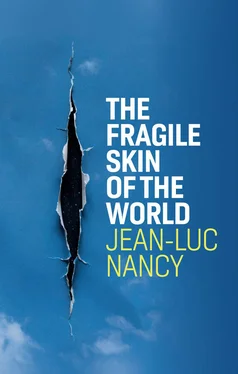The linear advance of the techno-economy at once locks the time to come within a calculable future and reveals its own aimlessness. What we call ‘the destruction of nature’ in fact destroys the very element that drives forth technics: 8this is the greatest point of tension, the issue most laden with anguish and expectation. If what is at stake is indeed self-destruction, then it is every bit as possible for the latter to consist of an annihilation as of a strong tremor that has come from elsewhere (elsewhere: where? Right here, of course).
As possible as impossible. Unforeseeable, incalculable, but as certain as the coming of time.
As ample, enveloping, and misleading as what Baudelaire calls ‘nature’ to designate that through which ‘man passes’ and only subsists by being carried away.
As the long echoes, shadowy, profound,
Heard from afar, blend in a unity,
[. . .]
Having dimensions infinitely vast [. . .] 9
This is why, if the ‘self-’ (the ‘auto-’ ) harbours danger, as I will say often in what follows, one must nonetheless not confuse it with the little ‘subject’ of our culture. We often reproach this subject for getting caught up in images, and for seeking to be ‘emancipated’, endowed with unlimited rights. But this unfortunate ‘subject’ is itself merely the product of a much larger expansion that has become pluriversal. The same goes for the subject as for the little ‘ego’ or ‘I’ of Freud at the surface of the considerable mass of the ‘id’ or ‘it’. And ‘it’ is also the resonance of all the long echoes of the time that is coming.
Instead of giving moral lectures to the subject, let’s attempt to think within this resonance. People will say to me: but what do you mean? My response is that I simply want to allow what is being sought out to speak of its own right. What is trying to speak precedes us by a great distance. From very far ahead of us and also behind us: I’m speaking of the world, of life and death, of the possibility of our cohabitations.
There is nothing alarmist or apocalyptic in thinking that existence as such can be brought before its own transience and finitude. It is precisely there that it takes on its infinite, unique, and unsubstitutable value.
Man infinitely surpasses man : one might say that this phrase of Pascal opened the scansion of the time that is coming towards us.
1 2 Günther Anders, Die Antiquiertheit des Menschen. Über die Seele im Zeitalter der zweiten industriellen Revolution, Munich, C. H. Beck, 1961, p.286. The text was originally published in 1956. [TR: My translation.]
2 3 [TR: In English in original, both here and later in the chapter.]
3 4 [TR: In English in original.]
4 5 See François Raffoul, ‘Derrida and the Ethics of the Im-possible’, Research in Phenomenology 38.2 (2008), 270–90.
5 6 See Jacques Derrida, On Touching – Jean-Luc Nancy, tr. Christine Irizarry, Stanford, California: Stanford University Press, 2005, p. 310.
6 7 It is nonetheless necessary to note just how strange it is that we have paid so little attention not only to Heidegger, but also to others such as Günther Anders or Jacques Ellul . . .
7 8 [TR: On the term ‘technics’, see my translator’s note at the beginning of Chapter II.]
8 9 Charles Baudelaire, ‘Correspondences’, in The Flowers of Evil, tr. James McGowan. Oxford: Oxford University Press, 1993, p. 19.
I A Time to Come without Past or Future 1
1
Today, we’re often tempted to perceive ourselves as forming a present deprived of a dependable past and future – ‘we’, inhabitants of the worlds that are called ‘developed’, which are enveloped a little more each day by a fog in which the contours and the sense of our progress become blurred. Our past, whether it’s that of humanism or that of communism, is of little help to us, and our future gives us more doubt than assurances. We also have a sense of immobility or of hesitating suspension in which we feel disoriented to the point of taking refuge in what certain have called a ‘presentism’. This term has had a theoretical meaning (the affirmation of the exclusive existence of the present) and a practical meaning (‘let’s focus on the present, the rest is out of our control’).
These attitudes are all ways of mourning history (a mourning that has been announced for more than a half century already) – of history, at least, understood as a relatively continuous process, a process relatively oriented towards a certain ‘good life’, to take up Aristotle’s expression qualifying the stakes of living in common. What for Aristotle depended on a judicious choice found itself being linked to progress, once the idea of perfecting techniques with a view to a better life was invented: from this point, history became in some way the instigator of choices with a view to the ‘better life’. But once we gained confidence in continuous improvement, things became complicated: every new level of mastery and domination was also a new threat – to take a single example, life’s longevity increased its fragility . . . In fact, history itself has weakened so much that it is vanishing, leaving us as the orphans of progress and the ‘good life’.
We bear this mourning of history poorly, with great difficulty. The lifeblood of our entire civilization has been supplied by a teleology that Nietzsche already suspected of masking the fractures of history. But we do not know how to think these fractures, and we have paid dearly for our desires to revive history with new myths.
In one sense I am (without presentism) convinced of the importance of cultivating the present, of receiving its present (its gift) as allogeneic with regard to time, as what Rimbaud names ‘regained’ eternity. But I insist on not confusing eternity with endlessness (the scholastics did this very well). It is not a matter of installing oneself in the present. Its gift is not the gift of any kind of stance – of a stanza, of stability, of a stele. Perhaps it even steals away as it gives, and (like the present) essentially steals away in the coming of its own succession. In succeeding itself, it passes, and in passing it opens itself to succeed once more. It comes by losing itself; it receives itself as that which cannot be anticipated, like all coming. In a word, it is not a future. The future is a present represented as certain or possible. (I’m alluding, as is clear, to a thinking that is very present, and very pregnant, in Derrida.) The to-come (to write it in this way), on the other hand, would be the pre-sence of the present, that which does not yet take place and which consequently is not (except in our expectations, our fears, our calculations). It therefore does not come out of the possible – but not the impossible either: it is not, and in not being it exposes us to an absence, which will only give us a fugitive present in its approach and its coming about.
There is thus nothing exceptional about our present condition. It is the temporal condition, and only a peculiar form of projection has caused us to predict programmed futures – predicted, and thus present before being so. We’ve known for a long time now that the predictions made by science fiction, and, more often than not, by science, were not achieved in the ways they had been foreseen. This does not prevent predictions from at times being clairvoyant, and sensitive to forces and forms that are presenting themselves. This does not prevent agendas from being achieved to perfection (like the atomic bomb or the moon landing), precisely because programming consists of taking everything that can be calculated, measured, and evaluated (including within contingency and risk) and making it present. Nor has this ever prevented the failure of a program (a space shuttle that explodes), or consequences that are uncalculated (wilfully or not), such as those of Hiroshima, both in its real and its symbolic effects.
Читать дальше












